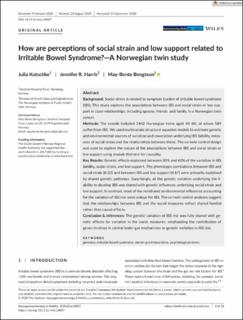| dc.description.abstract | Background: Social stress is related to symptom burden of irritable bowel syndrome (IBS). This study explores the associations between IBS and social strain or low support in Close relationships, including spouse, friends, and family, in a Norwegian twin cohort.Methods: The sample included 5442 Norwegian twins aged 40–80, of whom 589 suffer from IBS. We used multivariate structural equation models to estimate genetic and environmental sources of variation and covariation underlying IBS liability, measures of social stress and the relationships between these. The co-twin control design was used to explore the nature of the associations between IBS and social strain or low support using models that test for causality.Key Results: Genetic effects explained between 30% and 40% of the variation in IBS liability, social strain, and low support. The phenotypic correlations between IBS and social strain (0.20) and between IBS and low support (0.17) were primarily explained by shared genetic pathways. Surprisingly, all the genetic variation underlying the li-ability to develop IBS was shared with genetic influences underlying social strain and low support. In contrast, most of the nonshared environmental influences accounting for the variation of IBS risk were unique for IBS. The co-twin control analyses suggest that the relationships between IBS and the social measures reflect shared familial rather than causal effects. Conclusion & Inferences: The genetic variation of IBS risk was fully shared with genetic effects for variation in the social measures, emphasizing the contribution of genes involved in central brain–gut mechanisms to genetic variation in IBS risk | |
